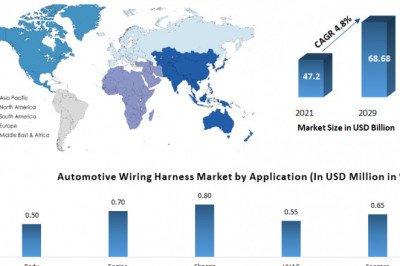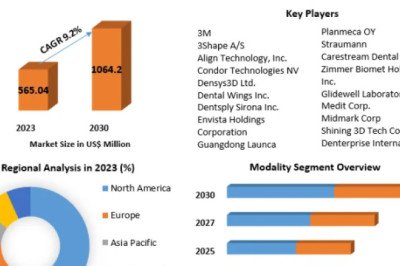
views
Market Overview:
The flight tracking system industry is projected to register a CAGR of 5.80% between 2021 and 2027.
Flight tracking system comprises of software and system employed to track the flights, aircraft, and airport activities. Such systems are used by commercial airport or flight operators for tracking and monitoring their flights or aircraft in case they deviate from the decided flight path. In a scenario where the flight or aircraft in consideration deviates from the decided path, the system alerts the concerned authorities about potential problems.
An increase in demand for new aircraft and a focus on ensuring flight safety and constant monitoring of aircraft are the primary factors driving the flight tracking system market insight. Over the next two decades, the global aviation industry is expected to grow significantly. The Asian markets are expected to be the major contributors to this growth, responsible for over 40 percent of new aircraft deliveries in the next two decades. Globally, China is forecasted to lead the aviation growth in terms of demand for new commercial and passenger aircraft deliveries over the next two decades. As a result, it can be said that despite the pandemic shock to aviation growth, the demand for new aircraft is expected to hit pre-pandemic levels in a couple of years and continue to soar over the next two decades.
Market Segmentation:
By Type
The ADS-B segment dominated the market: The ADS-B segment held the largest flight tracking system market industry share in 2020 and is expected to grow at the highest rate in the coming years during the forecast period. Growing focus upon improvement in situational awareness and enhancement of safety and air & ground operational efficiency levels are the primary factors propelling the growth of the ADS-B segment in the market. ADS-B technology can be employed for terrestrial and space-based applications.
Additionally, ADS-B does not require pilots or other external input. It also has the potential to replace radar as the primary surveillance method for controlling aircraft worldwide. Moreover, according to the Federal Aviation Administration (FAA) and European Aviation Safety Agency (EASA) mandate, since 2020, all aircraft operating in the US and Europe are required to transmit ADS-B positioning information in compliance with DO-260B standard. These factors are expected to help the ADS-B segment dominate the flight tracking system industry in the coming years.
The ACARS segment held a considerable market share in 2020: The ACARS segment accounted for a considerable market share in 2020. Much of this can be owed to various crucial functions that ACARS performs, including abnormal flight condition identification, providing detailed engine reports, and enabling messaging between the crew and air traffic control (ATC). ACARS also offers pole-to-pole global coverage. Meanwhile, in terms of real-time flight tracking, ADS-B is more efficient than ACARS. However, ACARS proves beneficial to track aircraft when out of range of ADS-B and radar systems.
The FANS segment generated significant revenues in 2020: The FANS segment generated substantial revenues in 2020. Although FANS is mostly employed in oceanic routes and remote airspace, the various benefits that it offers, such as various benefits, such as reduced fuel burn and flight time through direct routing and increased payload capability for takeoff-weight-limited flights, are the primary factors responsible for its increasing use in aircraft.
By End User
The military segment held the larger market share in 2020: The military segment dominated the flight tracking system industry in 2020 and is expected to continue doing so in the coming years during the review period. Much of this can be ascribed to the growing adoption of ADS-B in military aircraft.
According to the Open Sky Report 2017 on Mode S and ADS-B usage of military and other state aircraft, ADS-B equipage of military aircraft is considerably less than the deployment in civil aviation. Meanwhile, according to the 2018 Government Accountability Office (GAO) report, the ADS-B Out tracking tool falls short of fully protecting operational information from adversaries and remains vulnerable to electronic warfare and cyber-attacks. However, owing to the US Defense Department and FAA mandates, military aircraft are equipped with ADS-B technology.
The commercial segment is predicted to grow at a higher rate: The commercial segment is forecasted to register a higher growth rate in the coming years during the forecast period. The growing importance of flight tracking of commercial or non-military aircraft, including scheduled carriers, business jets, and other private aircraft, is expected to propel the growth of the commercial segment in the flight tracking system industry.
Moreover, the initiatives taken by organizations such as ICAO (International Civil Aviation Organization), FAA (Federal Aviation Administration), and EASA (European Aviation Safety Agency) to prevent the loss of commercial aircraft position reporting when an aircraft is experiencing distress or flying in remote airspace with no radar coverage are likely to boost the segment’s growth. Flight tracking also provides aircraft operators with a range of commercially important benefits. For instance, the operators are alerted automatically when aircraft behave unexpectedly in flight. This helps the operators improve flight efficiency and boost their gate-allocation, resource-scheduling, and flight-connection capabilities. Furthermore, it aids in providing information about flight positions, arrivals, and departures of airplanes to passengers, travelers, and flight enthusiasts.
Key Players
The flight tracking system key market players are Airbus SAS (NAVBLUE) (Netherlands), ACR Electronics Inc. (US), Aireon (US), AirNav Systems LLC (US), Blue Sky Network (US), FLYHT Aerospace Solutions Ltd. (Canada), Garmin Ltd. (US), Honeywell International Inc. (US), Raytheon Technologies Corporation (US), SITA (Switzerland), IBM Corporation (US), Spider Tracks Limited (New Zealand), Sabre (US), Lufthansa Systems (Germany)
Regional Analysis:
North America held the largest flight tracking system industry share in 2020 and is likely to grow considerably during the forecast timeline. The region has witnessed extensive investment by the airline companies to enhance the safety levels of the aircraft in their fleets. Moreover, the US military is adopting advanced technologies, particularly in the fields of wireless sensor networks, artificial intelligence, and high-speed communications, and investing in research and development of advanced tracking systems to enhance the capability of their flight tracking systems.
the APAC market to exhibit the fastest growth during the conjectured period, thanks to the presence of emerging economies in the region. With the rise in per capita disposable income, the region has witnessed rapidly increasing air passenger traffic over the past decade. The rise of the emerging middle class and increase in demand for aircraft is expected to drive aviation growth, thereby increasing the demand for flight tracking systems in the region. During the study period, the region is expected to generate more than 40% of the global demand for new aircraft, the majority of which is likely to be from rising economies in the region, such as China and India. After the Malaysia Airlines MH370 disappearance incident (March 2014), the regulatory authorities have been more concerned with safety levels than ever. The rising concern for flight safety is likely to fuel the flight tracking system industry growth during the forecast period.
Related reports:
Aerospace Bearing Market Research Report: Information by Platform (Commercial and Military), Type (Ball Bearing, Roller Bearing and others), Application (Engine, Flight Control Systems, Aerostructure, Landing Gear and others), Material (Stainless Steel, Fiber-Reinforced Composites, Engineered Plastics, Aluminium Alloys and others) and Region (North America, Middle East & Africa, Europe, Asia-Pacific and Latin America) - Forecast till 2027
Global Multirotor UAV Market Research By Application (Military, Homeland Security, Commercial), By Rotors (Less than 10, More than 10), By Payload (Cameras, Electro-Optical Sensors, GPS, Lidar, Laser Designator, and Others), & by Region–Forecast Till 2030
About Market Research Future:
Market Research Future (MRFR) is a global market research company that prides itself on its services, offering comprehensive and accurate analysis with respect to various markets and consumers worldwide. Market Research Future has the distinguished goal of providing customers with optimal quality research and granular research. Our market research by products, services, technologies, applications, end users, and market players for global, regional, and national market segments, allows our customers to see more, learn more, and do more, helping to answer your most important questions
Contact:
Market Research Future (part of Wantstats Research and Media Private Limited),
99 Hudson Street, 5Th Floor, New York, New York 10013,
United States of America
+1 646 845 9312












Comments
0 comment